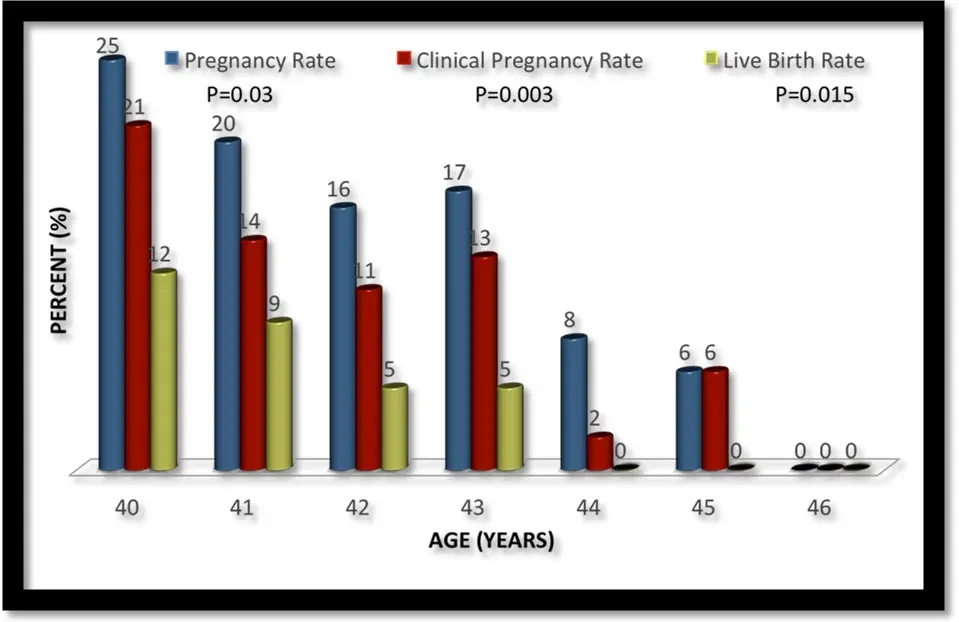Paternal age IVF has emerged as a critical topic in reproductive medicine, particularly as more couples delay parenthood. Research has indicated that sperm from men over the age of 45 is associated with higher IVF miscarriage rates and lower birth rates, even when using young donor eggs. This surprising revelation dispels the myth that sperm age has minimal impact on reproductive success after fertilization. Studies conducted in leading fertility clinics have shown that older paternal age can significantly affect embryo development and pregnancy outcomes. As awareness grows, it’s essential for couples to understand how male fertility, particularly in older age, plays a pivotal role in successful IVF treatments.
The increasing focus on paternal factors in reproductive health has introduced a range of terms synonymous with paternal age IVF, such as older father IVF and male age considerations in fertility treatments. Recent studies indicate that men in their mid-forties and beyond face unique challenges that can adversely affect outcomes like embryo viability and live birth rates. The concept of advanced paternal age is gaining recognition as a vital component of fertility discussions, especially regarding the risk of miscarriage. As healthcare providers and fertility clinics strive to improve reproductive success, it is crucial to consider how men’s biological age influences not just their own fertility but also the potential for successful pregnancies using donor eggs. This evolving understanding encourages a more holistic approach to fertility, encompassing both maternal and paternal factors.
Impact of Paternal Age on IVF Outcomes
Recent studies reveal significant insights into the role of paternal age in IVF outcomes. Particularly, sperm from men over 45 years old has been linked to increasing IVF miscarriage rates and lower live birth rates, raising urgent questions about assumptions made in reproductive medicine. Research shows that even when using young donor eggs, which are typically associated with higher success rates, older paternal age still adversely affects the chances of a healthy pregnancy. This breakthrough implies a need for a shift in focus during IVF counseling sessions to include discussions about male fertility and its implications.
The correlation between paternal age and reproductive success cannot be overstated. While the emphasis has long been on maternal age, the harmful impact of older males on embryo viability and pregnancy outcomes is becoming increasingly evident. As men age, the risks of sperm DNA fragmentation rise, leading to complications during fertilization and subsequent embryo development. Therefore, fertility clinics must not only prioritize maternal health but rigorously evaluate the contributions of male partners to enhance IVF success rates overall.
Understanding IVF Miscarriage Rates Among Older Fathers
IVF miscarriage rates have emerged as a critical topic of discussion, particularly concerning men aged over 45. Research indicates that the chances of miscarriage in this demographic can climb significantly compared to younger males. For instance, the study highlighted a worrying statistic of 23.8 percent miscarriage rates for couples with older fathers versus 16.3 percent for their younger counterparts. This discrepancy underlines the necessity for comprehensive evaluations in fertility treatments, where both partners’ ages are taken into account.
In light of these findings, it is essential for prospective parents utilizing IVF to understand the influence of paternal age on pregnancy viability. While couples may focus on female age and associated risks, studies suggest that the age of male partners poses considerable challenges that can’t be overlooked. This information needs to be disseminated by fertility clinics to better inform patients about potential outcomes, thereby ensuring a more balanced understanding of their reproductive journey.
Male Fertility and Its Role in Assisted Reproductive Technology
Male fertility plays an indispensable role in assisted reproductive technology (ART), including IVF. The evidence linking paternal age with reduced pregnancy outcomes highlights the critical need to evaluate male factors as part of fertility assessments. Experts have increasingly noted that while women are often the primary focus due to biological clocks, the quality of sperm significantly influences the chances of success in ART. As understanding grows, fertility clinics are urged to incorporate comprehensive fertility evaluations for men, which include sperm quality assessments.
Furthermore, addressing male fertility issues can provide couples with more effective options when pursuing ART. By emphasizing the importance of male reproductive health, clinics can better support couples facing challenges in conception. This holistic approach can not only enhance the success rates of IVF but also minimize emotional and financial stressors related to repeated unsuccessful attempts.
Donor Eggs Success Rates and Paternal Influence
The use of donor eggs has been heralded as a remedy for advancing maternal age, yet the success rates of this approach are still influenced by paternal factors. Research indicates that while donor eggs may provide higher quality genetic material, the age of the male partner can substantially affect the overall success of the procedure. When donor eggs are combined with sperm from men over 45, the impact is significant, with observable decreases in live birth rates and increases in miscarriage risks.
Clinics must therefore take these findings into account when developing treatment plans for their patients. It is essential to engage in open discussions about how a couple’s combined ages can influence IVF outcomes, ensuring that both partners are prepared for the realities of using donor eggs. This balanced approach can lead to better-informed decisions regarding fertility treatments and the overall management of patient expectations.
Reproductive Success: Considering Both Partners
Reproductive success in IVF hinges on a comprehensive understanding of both partners’ health and age. While maternal age has been a longstanding focus, emerging evidence emphasizes how essential it is to assess the male partner’s age as well. The higher miscarriage rates and lower live birth rates associated with older paternal age are crucial factors that should not be ignored in the broader conversation about reproductive health. Fertility clinics now face the challenge of presenting a more inclusive narrative that thoroughly examines both partners’ contributions to the IVF process.
Strategies for maximizing reproductive success must evolve to address these insights. This includes equipping healthcare providers with the knowledge to inform couples about the significance of male fertility issues and how advancing paternal age can impact clinical outcomes. By ensuring that both partners are involved in pre-treatment discussions, clinics can foster healthier IVF experiences and outcomes for their patients.
The Necessity for Balanced IVF Counseling
Effective IVF counseling needs to evolve into a more balanced framework that encompasses both maternal and paternal age. Given that studies demonstrate that older male fertility can significantly impact IVF results, experts stress the importance of discussing these factors openly with patients. Fertility clinics should incorporate this knowledge into their standard practice to ensure couples fully understand all variables affecting their chances for success.
By adopting a balanced counseling approach, fertility providers can empower couples to make informed decisions regarding their reproductive choices. This integrated method acknowledges the complexities of male fertility, allowing patients to better appreciate how different factors, including age, can shape their journey through assisted reproductive technology.
Improving IVF Success Rates Through Education
Education plays a vital role in improving IVF success rates, particularly in understanding the implications of paternal age. As research continues to reveal the risks associated with older sperm, it becomes imperative for fertility clinics to educate their patients accurately. By providing information not only on female fertility but also on male factors affecting reproduction, clinics can help set realistic expectations and improve overall outcomes.
Workshops, informational sessions, and one-on-one counseling can be effective strategies for disseminating this essential information. As healthcare providers take proactive steps to inform both partners about how age impacts reproductive health, they will aid couples in making better, personalized fertility choices. The more informed couples feel about the intricacies of their reproductive health, the more successful their IVF journeys can become.
Understanding IVF Counseling for Older Couples
As couples consider IVF in later stages of life, understanding IVF counseling becomes critical. Older couples, particularly those with partners over the age of 45, must be well-informed about the potential challenges posed by their ages on reproductive success. This underscores the need for fertility clinics to tailor their counseling to highlight both maternal and paternal age factors. Insights gained from studies have shown increased IVF miscarriage rates and lower live birth rates for older fathers, necessitating a proactive approach in discussions.
Opening up about these topics helps manage expectations and provides clarity about the potential risks involved. Clinics should aim to create an atmosphere where couples feel safe discussing sensitive matters regarding age and reproduction. By fostering transparent communication about both partners’ contributions, clinics can enhance the IVF counseling experience and subsequently improve treatment decisions.
Emotional Preparedness in IVF Treatment
Emotional preparedness is a key component of the IVF treatment journey. It involves understanding not only the medical statistics but also the emotional implications of the challenges posed by aging. The findings regarding higher miscarriage rates among older fathers can be daunting, and fertility clinics must recognize the emotional burden this may impose on couples seeking treatment. Providing adequate support and information can help couples navigate the complexities of their situation.
Moreover, fostering an environment where patients feel comfortable discussing their feelings about their reproductive journey is essential. Clinics should facilitate support groups, counseling services, and open dialogues to assist couples in coping with the emotional rollercoaster that often accompanies IVF treatment. By emphasizing emotional wellness along with medical counsel, clinics can contribute to a more holistic approach in treating families.
Frequently Asked Questions
How does paternal age affect IVF miscarriage rates?
Paternal age, particularly in men over 45, is linked to higher IVF miscarriage rates. A study indicated that miscarriage rates for couples with older male partners reached 23.8%, compared to 16.3% for younger men. This underscores the importance of considering paternal age in IVF counseling.
What are the implications of paternal age for male fertility in IVF?
Research shows that older paternal age can negatively impact male fertility, leading to lower reproductive success rates during IVF. Even with the use of donor eggs, men over 45 experienced lower live birth rates due to potential DNA errors in sperm.
Can using donor eggs improve success rates in IVF with older fathers?
While using donor eggs can enhance certain success rates in IVF, the age of the male partner still plays a significant role. Studies found that couples with men over 45 had lower live birth rates (35.1%) compared to those with younger fathers (41%), highlighting that both maternal and paternal ages are critical to reproductive success.
Why is it important for fertility clinics to consider paternal age during IVF treatments?
Fertility clinics must consider paternal age because it independently affects IVF outcomes, including miscarriage rates and live birth rates. As noted by experts, older men’s sperm are more likely to have DNA replication errors, which can hinder embryo development and the chances of a successful pregnancy.
How does the age of the male partner influence reproductive success in IVF?
The male partner’s age significantly impacts reproductive success in IVF. Studies indicate that men over 45 can lead to increased risks of miscarriage and lower birth rates, even when young donor eggs are utilized. This suggests that paternal age is a crucial factor in family planning and should be addressed during consultations.
What should men over 45 know about their fertility and IVF?
Men over 45 should be aware that their age can adversely affect fertility and IVF outcomes, such as increased miscarriage rates and reduced chances of a live birth. It’s crucial for these men to consult with fertility specialists about these risks and explore their options in reproductive medicine.
| Key Point | Details |
|---|---|
| Paternal Age Impact | Sperm from men over 45 is linked to higher miscarriage rates and lower live birth rates. |
| Study Overview | Analyzed 1,712 egg donation cycles in Italy and Spain from 2019 to 2023. |
| Miscarriage Rates | 23.8% in men over 45 versus 16.3% in younger men (45 or younger). |
| Live Birth Rates | 35.1% for older men compared to 41% for younger men. |
| Expert Opinions | Dr. Guglielmo highlights the need to consider paternal age in IVF counseling. |
Summary
Paternal age IVF has critical implications for reproductive outcomes. Research indicates that men over the age of 45 face increased risks of miscarriage and reduced live birth rates even when using eggs from younger donors. This highlights the necessity for fertility clinics to include discussions about paternal age in their counseling practices, ensuring that potential fathers are fully aware of how their age can impact IVF success.



